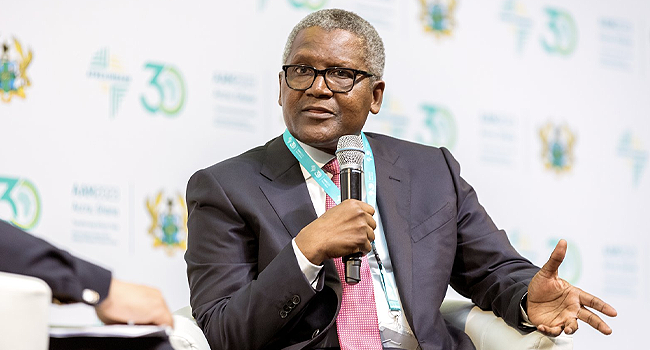The owner of the Lagos-based refinery, Aliko Dangote, stated on Tuesday that the Federal Executive Council (FEC) will be responsible for determining the pricing of petrol produced at his 650,000 barrels per day facility.
He added that once his company finalizes the necessary arrangements with the Nigerian National Petroleum Company Limited (NNPCL), the product will be ready for the market.
“Our PMS (Premium Motor Spirit) can be in filling stations within the next 48 hours depending on NNPCL,” he said.
Asked to speak on the pricing of petrol from his refinery, Dangote said, “It is an arrangement which is designed and approved by the Federal Executive Council led by His Excellency, President Bola Ahmed Tinubu.
“As soon as it is finalised, which he (Tinubu) is pushing, once we finish with NNPC, it can be today, it can be tomorrow, we are ready to roll into the market.”
He declared that “it’s a celebration day” for Nigerians and assured all citizens that they “are now going to have good petrol while the engines of your vehicles will last longer. You will not be having an engine issue, which a lot of us were having. It won’t happen at all”.
“The quality here will match that of anywhere in the world; US, America, we will make sure that nobody will beat us in terms of quality,” Dangote said.
Last December, Dangote, Africa’s leading industrialist, began operations at his $20 billion facility in Lagos, initially producing 350,000 barrels per day.
Although the refinery faced regulatory challenges, it aims to reach its full capacity of 650,000 barrels per day by the end of the year.
The refinery has already started supplying diesel and aviation fuel to marketers in the country, and has now commenced the production of petrol.
Nigeria, Africa’s most populous nation, faces significant energy challenges, with all its state-owned refineries currently non-operational. The country heavily relies on imported refined petroleum products, with the state-run NNPCL being the major importer.
Fuel queues are a common sight, and petrol prices have tripled since the removal of subsidies in May 2023, rising from around ₦200 per litre to about ₦800 per litre. This has exacerbated the difficulties faced by citizens who rely on petrol to power their vehicles and generators, due to the country’s long-standing issues with unreliable electricity supply.



